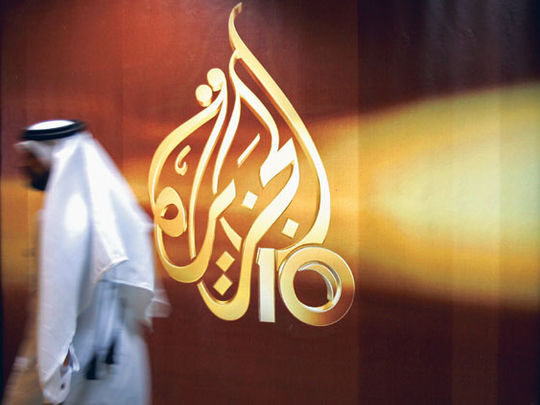
Dubai: Amid the current crisis in the Gulf region, and even previous ones, one name keeps coming up: Al Jazeera.
No other Arab TV channel has become the focus of controversy and polarizing force in the Arab region like the Qatari-government-owned Al Jazeera did in the past years.
Despite its popularity in the Middle East, no other media outlet became one of the reasons for rifts, diplomatic tension and even boycott like al Jazeera was because of its one sided coverage and what is described by many as the dominance of the Muslim Brotherhood on its editorial line. Many governments and people in the region believe Al Jazeera plays a “destructive role” and has become merely a propaganda tool for extremist parties.
In the current crisis, some analysts in the Gulf region are saying the closure of Al Jazeera could be one of the demands to ease the tension and restore the diplomatic relations between five Arab countries and Qatar.
On Monday, Saudi Arabia, the UAE and Bahrain, as well as Egypt and Libya, cut diplomatic ad trade ties with Qatar over Doha’s links to terrorist groups, which Qatari officials repeatedly denied.
One of the reasons mentioned behind the move is the coverage of Al Jazeera, which analysts say motivated by ideological principles rather than sheer journalism.
“Qatar Emir first gesture of good will likely be the shutting of Al Jazeera TV network entirely, which could happen in months in not weeks,” Sultan Al Qassemi, a prominent commentator in the Gulf region, wrote in a tweet.
But other analysts said “if Al Jazeera isn’t shutdown, then there will be serious clauses about what it can and can’t cover,” Michael Stephens, a research fellow at the royal United Services Institute in London was quoted as saying by a CNN.
Established in late 1996 with a motto “The Opinion and The Other Opinion”, Al Jazeera had made the majority of Arab countries angry with Qatar, at different times, because of “its obviously one-sided and biased coverage of regional developments in the region,” a Cairo-based analyst said.
“When Al Jazeera was launched it offered a new media form, and it was almost a cloning form of the American news channel of CNN,” Mohamed al Desouky, an Egyptian journalist with Al Ahram newspaper told Gulf News on Monday.
That time, there were no dedicated news channels in the Arab region, and Al Jazeera had some of the best trained and highly qualified staff, who offered “some appreciated professional coverage”, he noted.
Al Jazeera also started talking about some topics that were not dealt with before, such as human rights and democracy. It also offered in-depth documentaries to the audience, Al Desouky said.
Because of that, it gained the trust of many Arab viewers. “Until this (media) tool became a tool to manipulate the public opinion for political goals,” Al Desouky added, saying that the channel began losing credibility and creating controversies and political tension. “That became a style for al Jazeera.”
Its guests were seemingly encouraged to be provocative. Its editorial language generated anger, and its coverage caused rage. Some Arab government, blaming the Qatari government, closed Al Jazeera offices and expelled its reporters.
Al Jazeera meanwhile did not cover internal Qatari issues with the same prism it covers other Arab issues, and that is one of the issues taken against it.
“Unfortunately, Al Jazeera has some good professionals, but it doesn’t have objectivity,” said a Bahraini researcher and journalist, who asked not be named. “Al Jazeera has the tools to make media influence…but is what it’s offering the truth? The answer is no.”
Al Jazeera has a “certain agenda on Arab issues and it deals with different Arab countries differently…. But generally speaking its agenda is not accepted, and this the least than can be said,” the Bahraini journalist said, noting that Al Jazeera liked to portray the Bahraini security forces as an oppressing organization and the kingdom as a regime with no respect to human rights in its coverage to internal developments in Bahrain.
Its coverage of Egyptian developments was not much better. “Al Jazeera always questioned the actions of the national Egyptian army in fighting terrorism with such claims that the army is killing civilians.
Where did they get this information from, and what is their proof? This is totally untrue,” said Al Desouky. “It also hosted guests in its shows to offer a dark side and negative image of what is happening in the country”.
Another issue is related to the words used. Due to heavy influence of the Muslim Brotherhood over the channel, Al Jazeera liked to call Egypt’s June 30, 2013 revolution that overthrew Islamist president Mohammed Morsi as a “coup d’état”, despite repeated warnings from Cairo and other Arab countries that Al Jazeera has become a mouthpiece for the Brotherhood.











